Political Economy of Development: Capitalism and State Role
VerifiedAdded on 2021/05/31
|17
|4321
|23
Report
AI Summary
This report delves into the political economy of development, with a specific focus on the capitalist system and its manifestations in India. It begins by defining capitalism and exploring its various perspectives, particularly from an Indian standpoint. The report then examines the imbalanced distribution of growth inherent in capitalist systems and investigates the exploitative nature of these systems, providing examples and analysis. A significant portion of the report is dedicated to the role of the state in either exacerbating or mitigating these imbalances. The analysis considers government intervention and its impact on economic outcomes. The report also explores the concept of crony capitalism and its effects on resource allocation. Finally, the report concludes with a summary of its findings, offering insights into the complex relationship between capitalism, the state, and the distribution of wealth and resources in developing economies.
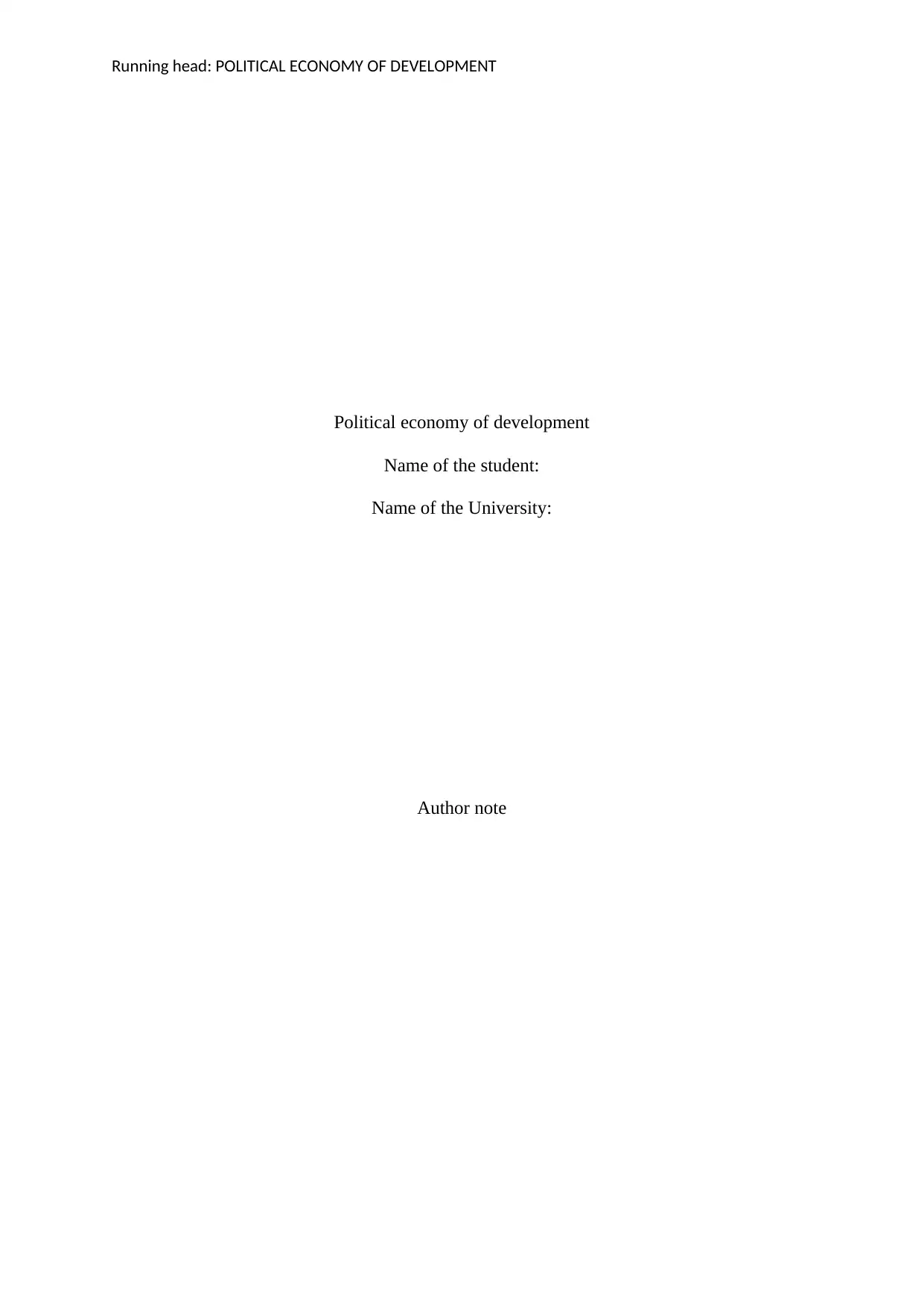
Running head: POLITICAL ECONOMY OF DEVELOPMENT
Political economy of development
Name of the student:
Name of the University:
Author note
Political economy of development
Name of the student:
Name of the University:
Author note
Paraphrase This Document
Need a fresh take? Get an instant paraphrase of this document with our AI Paraphraser
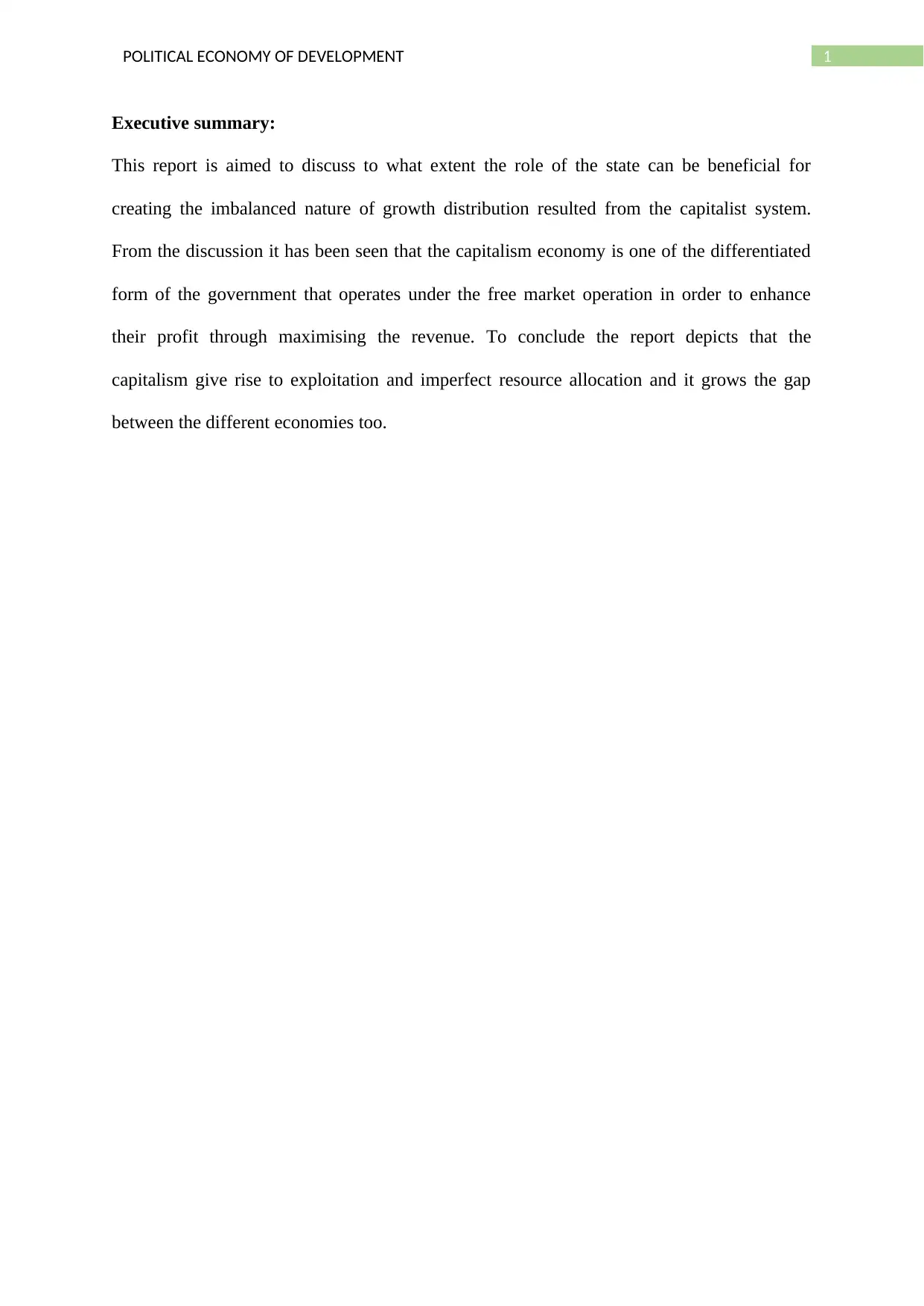
1POLITICAL ECONOMY OF DEVELOPMENT
Executive summary:
This report is aimed to discuss to what extent the role of the state can be beneficial for
creating the imbalanced nature of growth distribution resulted from the capitalist system.
From the discussion it has been seen that the capitalism economy is one of the differentiated
form of the government that operates under the free market operation in order to enhance
their profit through maximising the revenue. To conclude the report depicts that the
capitalism give rise to exploitation and imperfect resource allocation and it grows the gap
between the different economies too.
Executive summary:
This report is aimed to discuss to what extent the role of the state can be beneficial for
creating the imbalanced nature of growth distribution resulted from the capitalist system.
From the discussion it has been seen that the capitalism economy is one of the differentiated
form of the government that operates under the free market operation in order to enhance
their profit through maximising the revenue. To conclude the report depicts that the
capitalism give rise to exploitation and imperfect resource allocation and it grows the gap
between the different economies too.
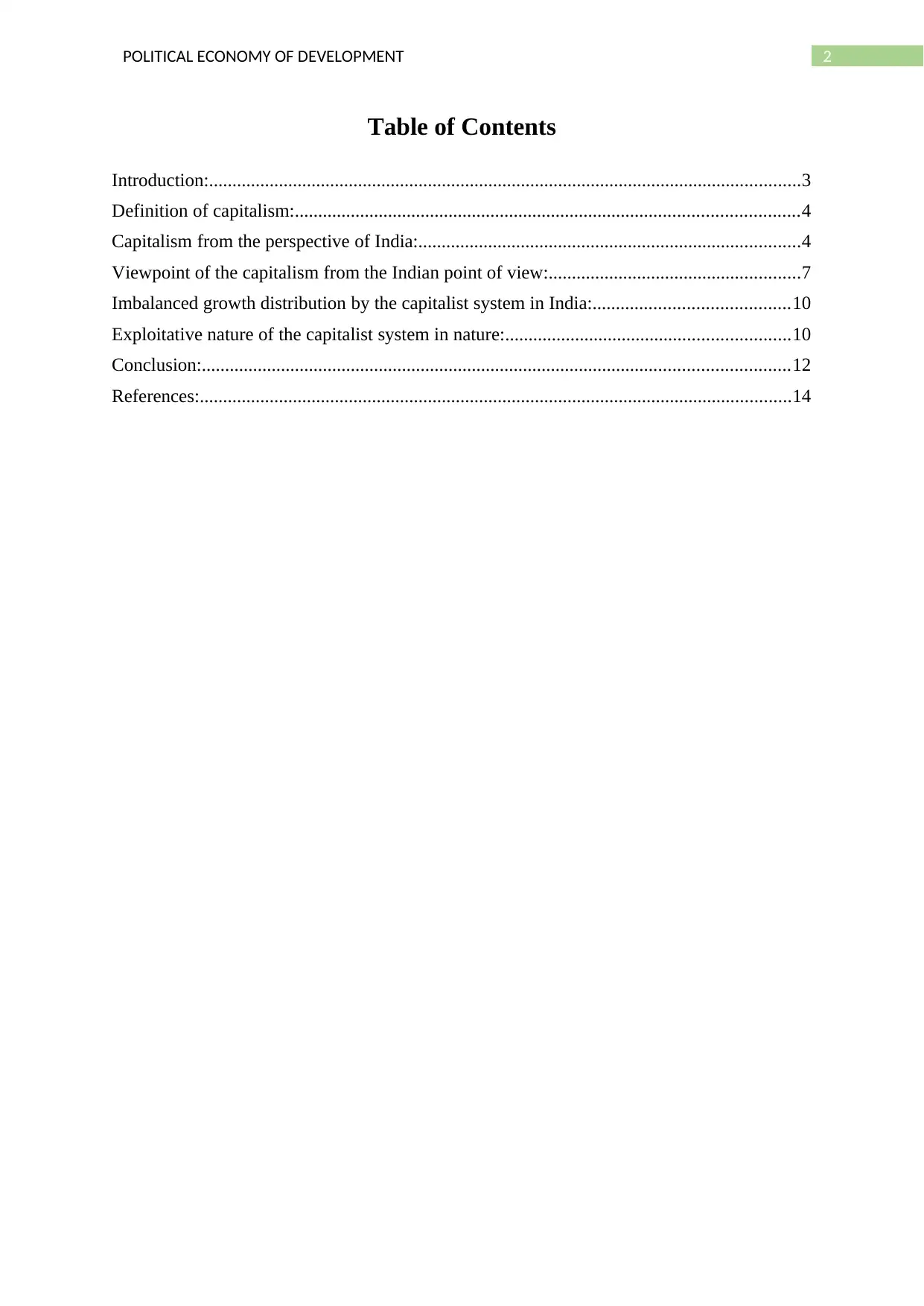
2POLITICAL ECONOMY OF DEVELOPMENT
Table of Contents
Introduction:...............................................................................................................................3
Definition of capitalism:............................................................................................................4
Capitalism from the perspective of India:..................................................................................4
Viewpoint of the capitalism from the Indian point of view:......................................................7
Imbalanced growth distribution by the capitalist system in India:..........................................10
Exploitative nature of the capitalist system in nature:.............................................................10
Conclusion:..............................................................................................................................12
References:...............................................................................................................................14
Table of Contents
Introduction:...............................................................................................................................3
Definition of capitalism:............................................................................................................4
Capitalism from the perspective of India:..................................................................................4
Viewpoint of the capitalism from the Indian point of view:......................................................7
Imbalanced growth distribution by the capitalist system in India:..........................................10
Exploitative nature of the capitalist system in nature:.............................................................10
Conclusion:..............................................................................................................................12
References:...............................................................................................................................14
⊘ This is a preview!⊘
Do you want full access?
Subscribe today to unlock all pages.

Trusted by 1+ million students worldwide
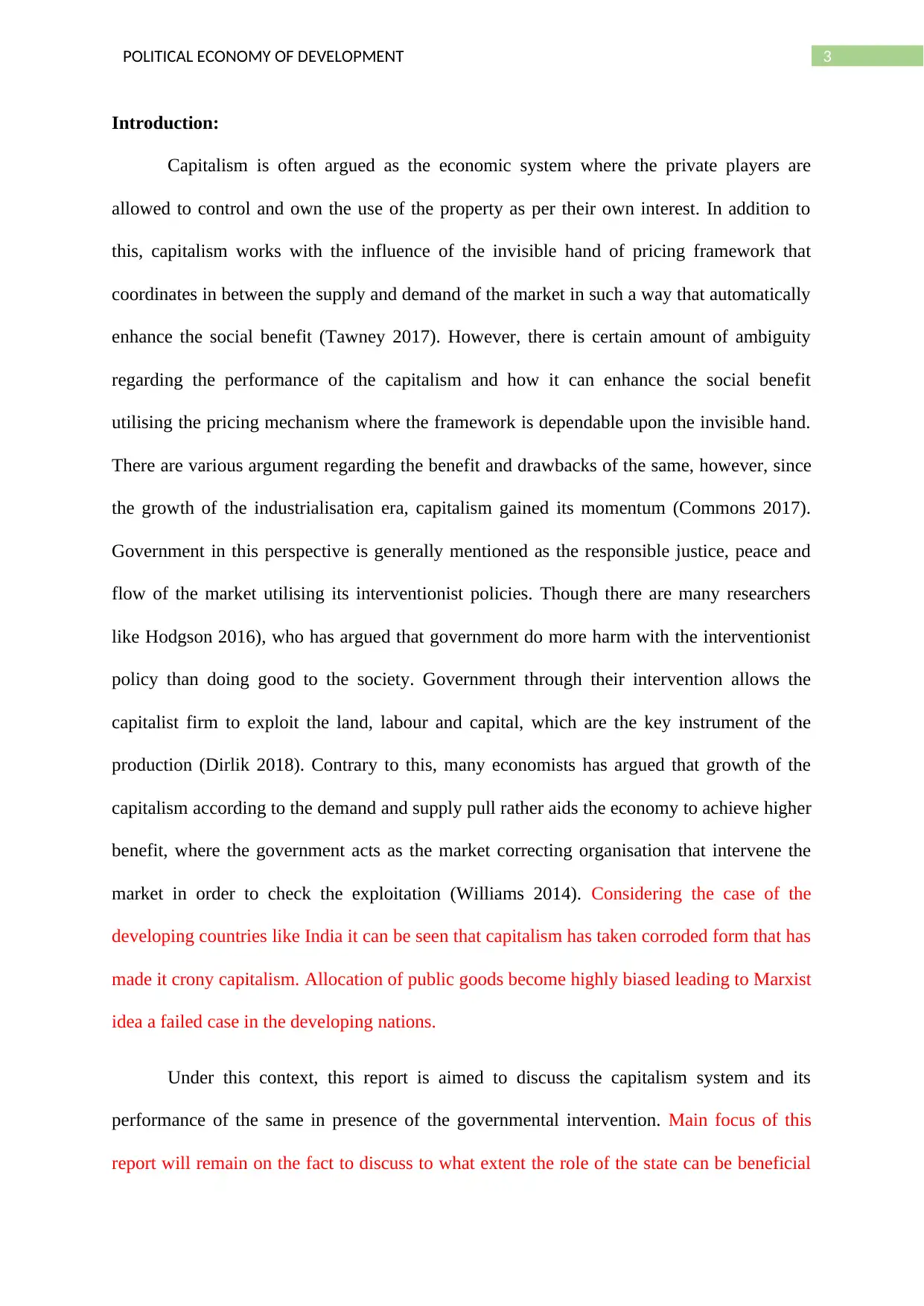
3POLITICAL ECONOMY OF DEVELOPMENT
Introduction:
Capitalism is often argued as the economic system where the private players are
allowed to control and own the use of the property as per their own interest. In addition to
this, capitalism works with the influence of the invisible hand of pricing framework that
coordinates in between the supply and demand of the market in such a way that automatically
enhance the social benefit (Tawney 2017). However, there is certain amount of ambiguity
regarding the performance of the capitalism and how it can enhance the social benefit
utilising the pricing mechanism where the framework is dependable upon the invisible hand.
There are various argument regarding the benefit and drawbacks of the same, however, since
the growth of the industrialisation era, capitalism gained its momentum (Commons 2017).
Government in this perspective is generally mentioned as the responsible justice, peace and
flow of the market utilising its interventionist policies. Though there are many researchers
like Hodgson 2016), who has argued that government do more harm with the interventionist
policy than doing good to the society. Government through their intervention allows the
capitalist firm to exploit the land, labour and capital, which are the key instrument of the
production (Dirlik 2018). Contrary to this, many economists has argued that growth of the
capitalism according to the demand and supply pull rather aids the economy to achieve higher
benefit, where the government acts as the market correcting organisation that intervene the
market in order to check the exploitation (Williams 2014). Considering the case of the
developing countries like India it can be seen that capitalism has taken corroded form that has
made it crony capitalism. Allocation of public goods become highly biased leading to Marxist
idea a failed case in the developing nations.
Under this context, this report is aimed to discuss the capitalism system and its
performance of the same in presence of the governmental intervention. Main focus of this
report will remain on the fact to discuss to what extent the role of the state can be beneficial
Introduction:
Capitalism is often argued as the economic system where the private players are
allowed to control and own the use of the property as per their own interest. In addition to
this, capitalism works with the influence of the invisible hand of pricing framework that
coordinates in between the supply and demand of the market in such a way that automatically
enhance the social benefit (Tawney 2017). However, there is certain amount of ambiguity
regarding the performance of the capitalism and how it can enhance the social benefit
utilising the pricing mechanism where the framework is dependable upon the invisible hand.
There are various argument regarding the benefit and drawbacks of the same, however, since
the growth of the industrialisation era, capitalism gained its momentum (Commons 2017).
Government in this perspective is generally mentioned as the responsible justice, peace and
flow of the market utilising its interventionist policies. Though there are many researchers
like Hodgson 2016), who has argued that government do more harm with the interventionist
policy than doing good to the society. Government through their intervention allows the
capitalist firm to exploit the land, labour and capital, which are the key instrument of the
production (Dirlik 2018). Contrary to this, many economists has argued that growth of the
capitalism according to the demand and supply pull rather aids the economy to achieve higher
benefit, where the government acts as the market correcting organisation that intervene the
market in order to check the exploitation (Williams 2014). Considering the case of the
developing countries like India it can be seen that capitalism has taken corroded form that has
made it crony capitalism. Allocation of public goods become highly biased leading to Marxist
idea a failed case in the developing nations.
Under this context, this report is aimed to discuss the capitalism system and its
performance of the same in presence of the governmental intervention. Main focus of this
report will remain on the fact to discuss to what extent the role of the state can be beneficial
Paraphrase This Document
Need a fresh take? Get an instant paraphrase of this document with our AI Paraphraser
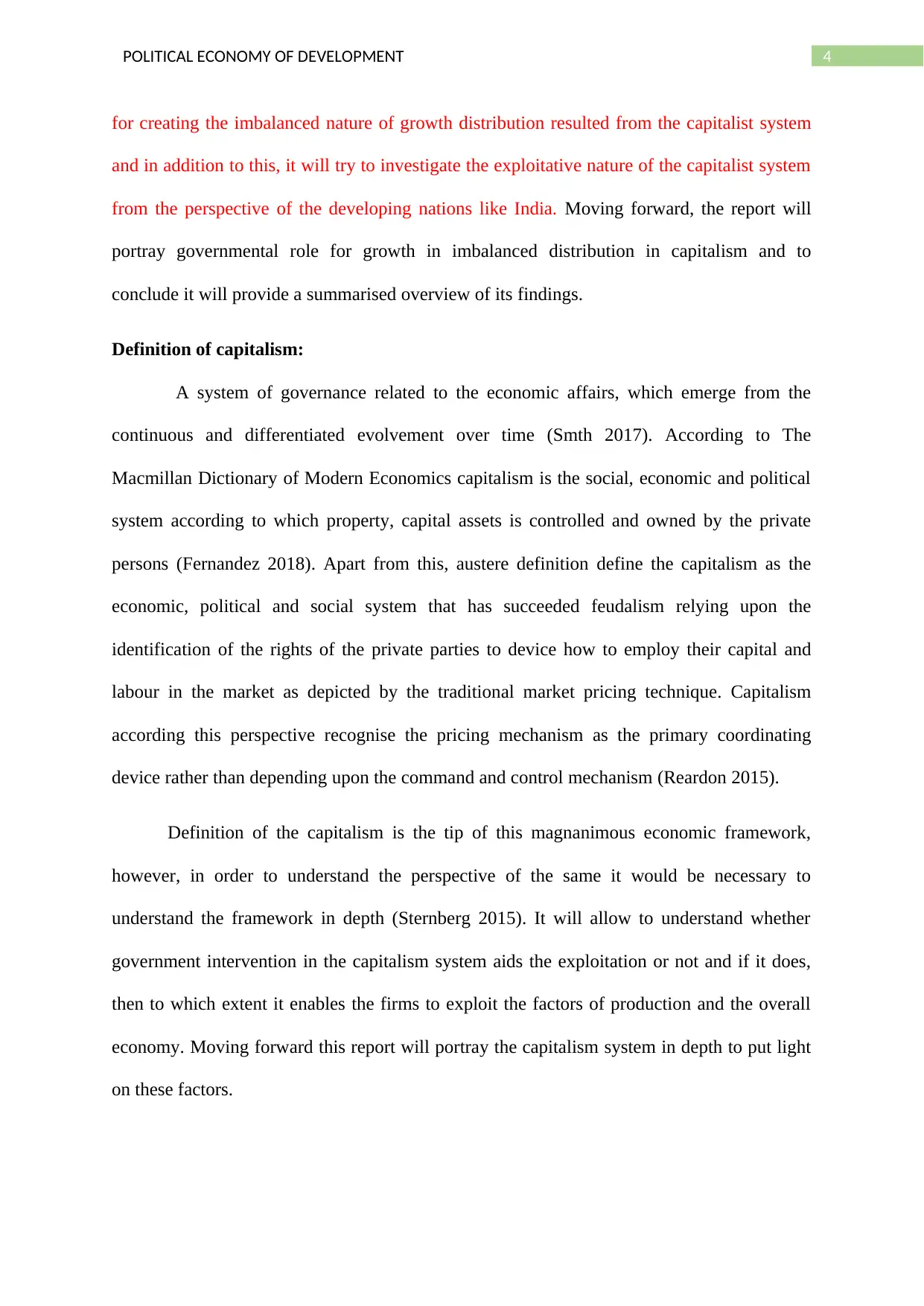
4POLITICAL ECONOMY OF DEVELOPMENT
for creating the imbalanced nature of growth distribution resulted from the capitalist system
and in addition to this, it will try to investigate the exploitative nature of the capitalist system
from the perspective of the developing nations like India. Moving forward, the report will
portray governmental role for growth in imbalanced distribution in capitalism and to
conclude it will provide a summarised overview of its findings.
Definition of capitalism:
A system of governance related to the economic affairs, which emerge from the
continuous and differentiated evolvement over time (Smth 2017). According to The
Macmillan Dictionary of Modern Economics capitalism is the social, economic and political
system according to which property, capital assets is controlled and owned by the private
persons (Fernandez 2018). Apart from this, austere definition define the capitalism as the
economic, political and social system that has succeeded feudalism relying upon the
identification of the rights of the private parties to device how to employ their capital and
labour in the market as depicted by the traditional market pricing technique. Capitalism
according this perspective recognise the pricing mechanism as the primary coordinating
device rather than depending upon the command and control mechanism (Reardon 2015).
Definition of the capitalism is the tip of this magnanimous economic framework,
however, in order to understand the perspective of the same it would be necessary to
understand the framework in depth (Sternberg 2015). It will allow to understand whether
government intervention in the capitalism system aids the exploitation or not and if it does,
then to which extent it enables the firms to exploit the factors of production and the overall
economy. Moving forward this report will portray the capitalism system in depth to put light
on these factors.
for creating the imbalanced nature of growth distribution resulted from the capitalist system
and in addition to this, it will try to investigate the exploitative nature of the capitalist system
from the perspective of the developing nations like India. Moving forward, the report will
portray governmental role for growth in imbalanced distribution in capitalism and to
conclude it will provide a summarised overview of its findings.
Definition of capitalism:
A system of governance related to the economic affairs, which emerge from the
continuous and differentiated evolvement over time (Smth 2017). According to The
Macmillan Dictionary of Modern Economics capitalism is the social, economic and political
system according to which property, capital assets is controlled and owned by the private
persons (Fernandez 2018). Apart from this, austere definition define the capitalism as the
economic, political and social system that has succeeded feudalism relying upon the
identification of the rights of the private parties to device how to employ their capital and
labour in the market as depicted by the traditional market pricing technique. Capitalism
according this perspective recognise the pricing mechanism as the primary coordinating
device rather than depending upon the command and control mechanism (Reardon 2015).
Definition of the capitalism is the tip of this magnanimous economic framework,
however, in order to understand the perspective of the same it would be necessary to
understand the framework in depth (Sternberg 2015). It will allow to understand whether
government intervention in the capitalism system aids the exploitation or not and if it does,
then to which extent it enables the firms to exploit the factors of production and the overall
economy. Moving forward this report will portray the capitalism system in depth to put light
on these factors.
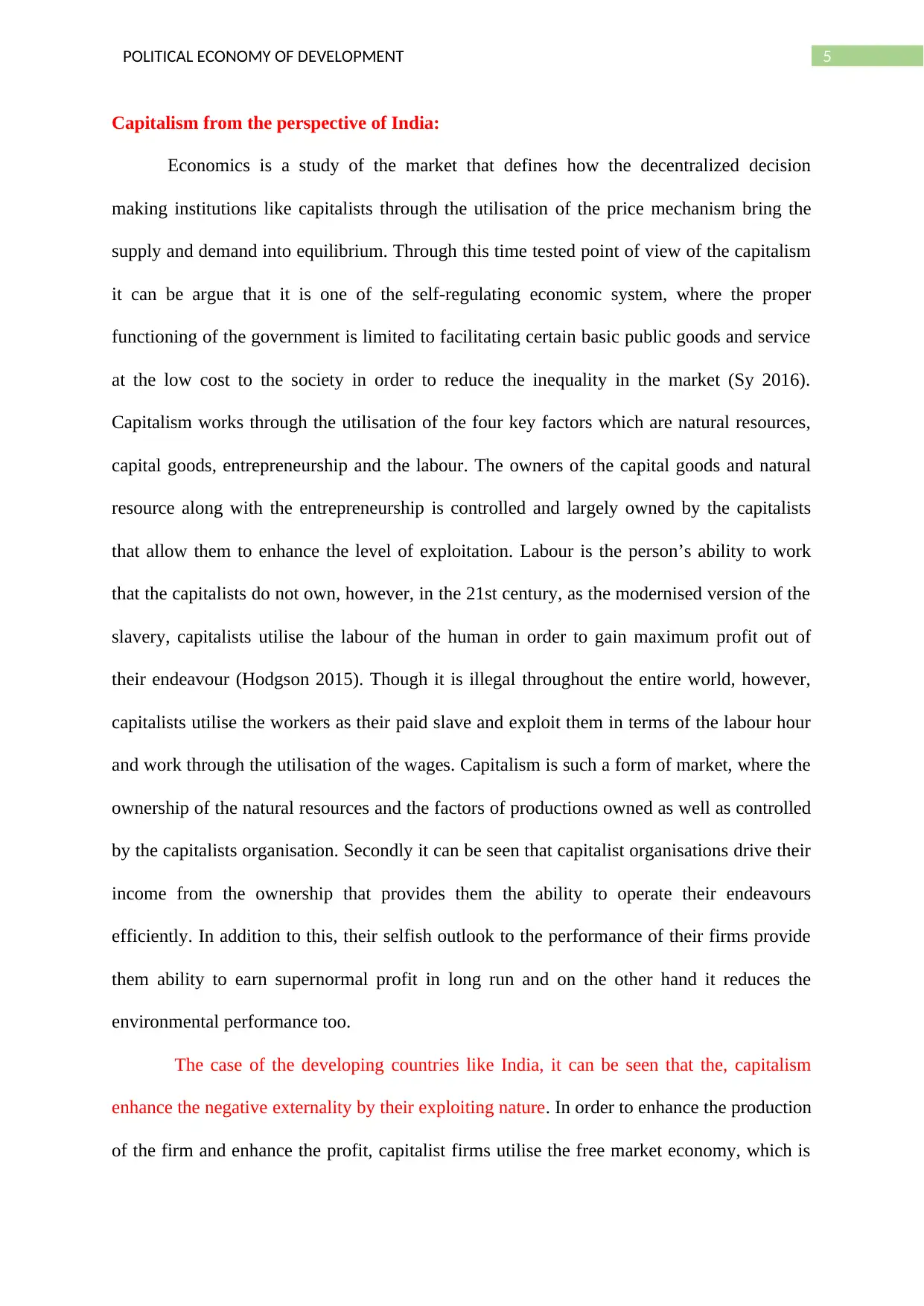
5POLITICAL ECONOMY OF DEVELOPMENT
Capitalism from the perspective of India:
Economics is a study of the market that defines how the decentralized decision
making institutions like capitalists through the utilisation of the price mechanism bring the
supply and demand into equilibrium. Through this time tested point of view of the capitalism
it can be argue that it is one of the self-regulating economic system, where the proper
functioning of the government is limited to facilitating certain basic public goods and service
at the low cost to the society in order to reduce the inequality in the market (Sy 2016).
Capitalism works through the utilisation of the four key factors which are natural resources,
capital goods, entrepreneurship and the labour. The owners of the capital goods and natural
resource along with the entrepreneurship is controlled and largely owned by the capitalists
that allow them to enhance the level of exploitation. Labour is the person’s ability to work
that the capitalists do not own, however, in the 21st century, as the modernised version of the
slavery, capitalists utilise the labour of the human in order to gain maximum profit out of
their endeavour (Hodgson 2015). Though it is illegal throughout the entire world, however,
capitalists utilise the workers as their paid slave and exploit them in terms of the labour hour
and work through the utilisation of the wages. Capitalism is such a form of market, where the
ownership of the natural resources and the factors of productions owned as well as controlled
by the capitalists organisation. Secondly it can be seen that capitalist organisations drive their
income from the ownership that provides them the ability to operate their endeavours
efficiently. In addition to this, their selfish outlook to the performance of their firms provide
them ability to earn supernormal profit in long run and on the other hand it reduces the
environmental performance too.
The case of the developing countries like India, it can be seen that the, capitalism
enhance the negative externality by their exploiting nature. In order to enhance the production
of the firm and enhance the profit, capitalist firms utilise the free market economy, which is
Capitalism from the perspective of India:
Economics is a study of the market that defines how the decentralized decision
making institutions like capitalists through the utilisation of the price mechanism bring the
supply and demand into equilibrium. Through this time tested point of view of the capitalism
it can be argue that it is one of the self-regulating economic system, where the proper
functioning of the government is limited to facilitating certain basic public goods and service
at the low cost to the society in order to reduce the inequality in the market (Sy 2016).
Capitalism works through the utilisation of the four key factors which are natural resources,
capital goods, entrepreneurship and the labour. The owners of the capital goods and natural
resource along with the entrepreneurship is controlled and largely owned by the capitalists
that allow them to enhance the level of exploitation. Labour is the person’s ability to work
that the capitalists do not own, however, in the 21st century, as the modernised version of the
slavery, capitalists utilise the labour of the human in order to gain maximum profit out of
their endeavour (Hodgson 2015). Though it is illegal throughout the entire world, however,
capitalists utilise the workers as their paid slave and exploit them in terms of the labour hour
and work through the utilisation of the wages. Capitalism is such a form of market, where the
ownership of the natural resources and the factors of productions owned as well as controlled
by the capitalists organisation. Secondly it can be seen that capitalist organisations drive their
income from the ownership that provides them the ability to operate their endeavours
efficiently. In addition to this, their selfish outlook to the performance of their firms provide
them ability to earn supernormal profit in long run and on the other hand it reduces the
environmental performance too.
The case of the developing countries like India, it can be seen that the, capitalism
enhance the negative externality by their exploiting nature. In order to enhance the production
of the firm and enhance the profit, capitalist firms utilise the free market economy, which is
⊘ This is a preview!⊘
Do you want full access?
Subscribe today to unlock all pages.

Trusted by 1+ million students worldwide
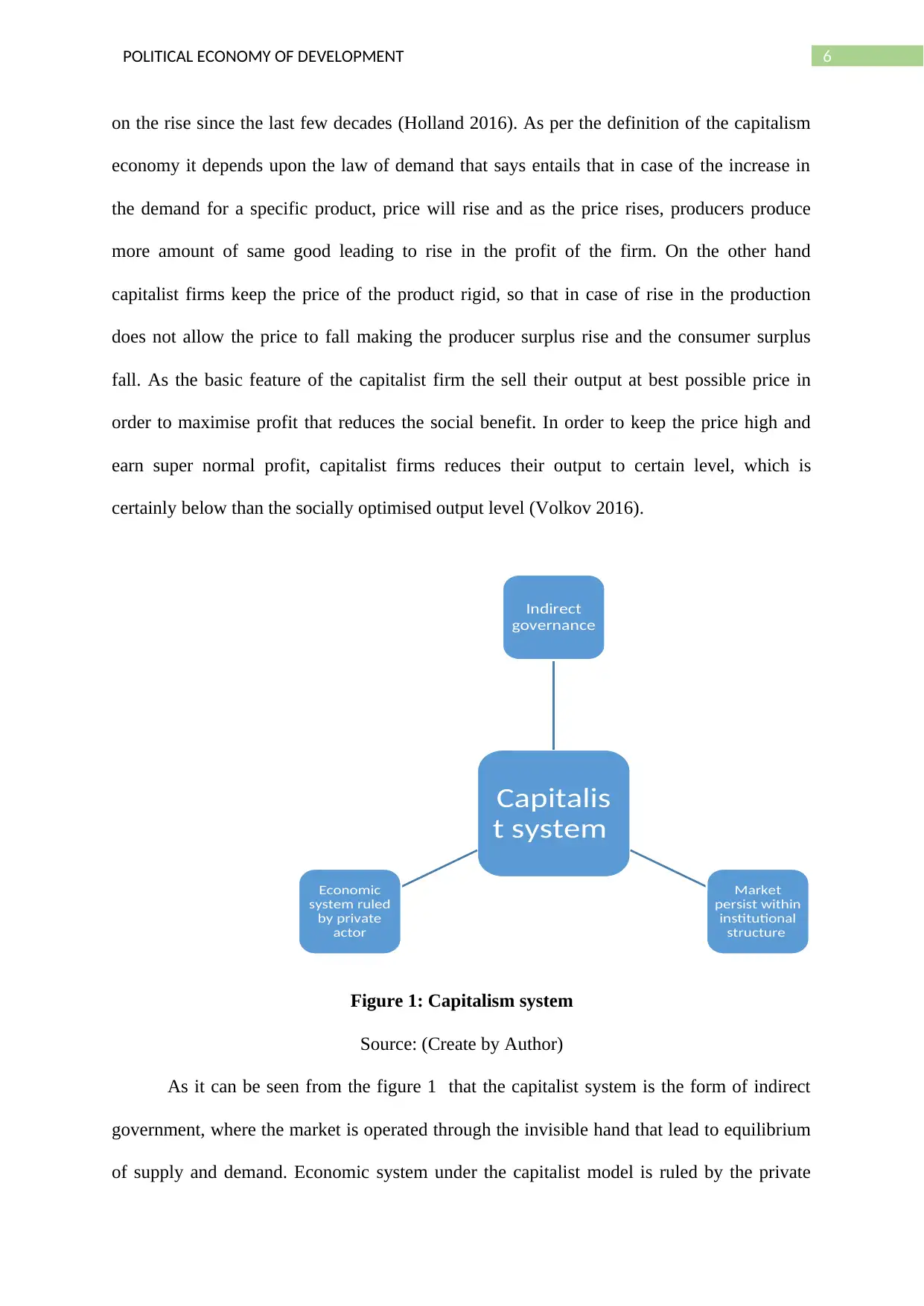
6POLITICAL ECONOMY OF DEVELOPMENT
on the rise since the last few decades (Holland 2016). As per the definition of the capitalism
economy it depends upon the law of demand that says entails that in case of the increase in
the demand for a specific product, price will rise and as the price rises, producers produce
more amount of same good leading to rise in the profit of the firm. On the other hand
capitalist firms keep the price of the product rigid, so that in case of rise in the production
does not allow the price to fall making the producer surplus rise and the consumer surplus
fall. As the basic feature of the capitalist firm the sell their output at best possible price in
order to maximise profit that reduces the social benefit. In order to keep the price high and
earn super normal profit, capitalist firms reduces their output to certain level, which is
certainly below than the socially optimised output level (Volkov 2016).
Figure 1: Capitalism system
Source: (Create by Author)
As it can be seen from the figure 1 that the capitalist system is the form of indirect
government, where the market is operated through the invisible hand that lead to equilibrium
of supply and demand. Economic system under the capitalist model is ruled by the private
Capitalis
t system
Indirect
governance
Market
persist within
institutional
structure
Economic
system ruled
by private
actor
on the rise since the last few decades (Holland 2016). As per the definition of the capitalism
economy it depends upon the law of demand that says entails that in case of the increase in
the demand for a specific product, price will rise and as the price rises, producers produce
more amount of same good leading to rise in the profit of the firm. On the other hand
capitalist firms keep the price of the product rigid, so that in case of rise in the production
does not allow the price to fall making the producer surplus rise and the consumer surplus
fall. As the basic feature of the capitalist firm the sell their output at best possible price in
order to maximise profit that reduces the social benefit. In order to keep the price high and
earn super normal profit, capitalist firms reduces their output to certain level, which is
certainly below than the socially optimised output level (Volkov 2016).
Figure 1: Capitalism system
Source: (Create by Author)
As it can be seen from the figure 1 that the capitalist system is the form of indirect
government, where the market is operated through the invisible hand that lead to equilibrium
of supply and demand. Economic system under the capitalist model is ruled by the private
Capitalis
t system
Indirect
governance
Market
persist within
institutional
structure
Economic
system ruled
by private
actor
Paraphrase This Document
Need a fresh take? Get an instant paraphrase of this document with our AI Paraphraser
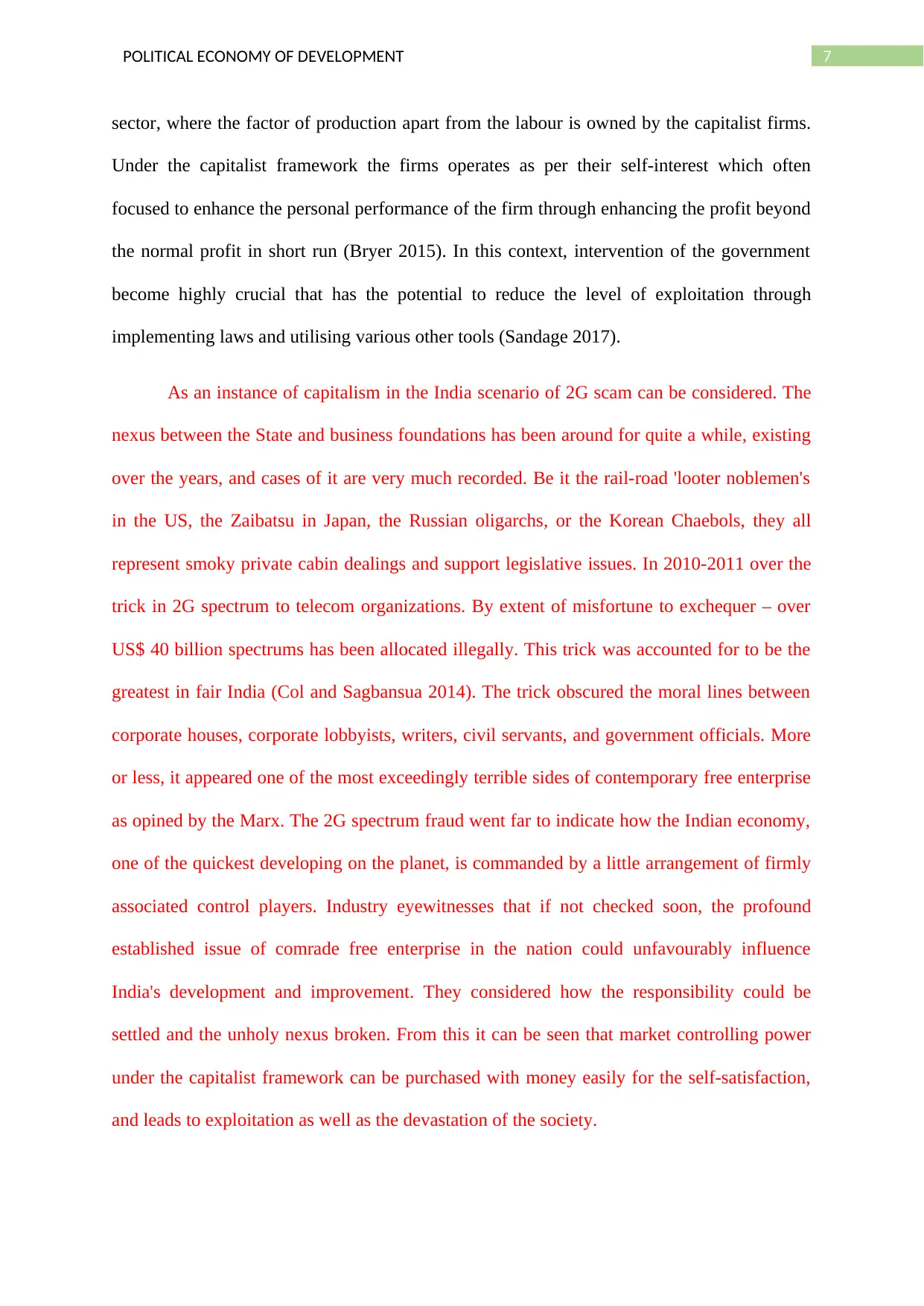
7POLITICAL ECONOMY OF DEVELOPMENT
sector, where the factor of production apart from the labour is owned by the capitalist firms.
Under the capitalist framework the firms operates as per their self-interest which often
focused to enhance the personal performance of the firm through enhancing the profit beyond
the normal profit in short run (Bryer 2015). In this context, intervention of the government
become highly crucial that has the potential to reduce the level of exploitation through
implementing laws and utilising various other tools (Sandage 2017).
As an instance of capitalism in the India scenario of 2G scam can be considered. The
nexus between the State and business foundations has been around for quite a while, existing
over the years, and cases of it are very much recorded. Be it the rail-road 'looter noblemen's
in the US, the Zaibatsu in Japan, the Russian oligarchs, or the Korean Chaebols, they all
represent smoky private cabin dealings and support legislative issues. In 2010-2011 over the
trick in 2G spectrum to telecom organizations. By extent of misfortune to exchequer – over
US$ 40 billion spectrums has been allocated illegally. This trick was accounted for to be the
greatest in fair India (Col and Sagbansua 2014). The trick obscured the moral lines between
corporate houses, corporate lobbyists, writers, civil servants, and government officials. More
or less, it appeared one of the most exceedingly terrible sides of contemporary free enterprise
as opined by the Marx. The 2G spectrum fraud went far to indicate how the Indian economy,
one of the quickest developing on the planet, is commanded by a little arrangement of firmly
associated control players. Industry eyewitnesses that if not checked soon, the profound
established issue of comrade free enterprise in the nation could unfavourably influence
India's development and improvement. They considered how the responsibility could be
settled and the unholy nexus broken. From this it can be seen that market controlling power
under the capitalist framework can be purchased with money easily for the self-satisfaction,
and leads to exploitation as well as the devastation of the society.
sector, where the factor of production apart from the labour is owned by the capitalist firms.
Under the capitalist framework the firms operates as per their self-interest which often
focused to enhance the personal performance of the firm through enhancing the profit beyond
the normal profit in short run (Bryer 2015). In this context, intervention of the government
become highly crucial that has the potential to reduce the level of exploitation through
implementing laws and utilising various other tools (Sandage 2017).
As an instance of capitalism in the India scenario of 2G scam can be considered. The
nexus between the State and business foundations has been around for quite a while, existing
over the years, and cases of it are very much recorded. Be it the rail-road 'looter noblemen's
in the US, the Zaibatsu in Japan, the Russian oligarchs, or the Korean Chaebols, they all
represent smoky private cabin dealings and support legislative issues. In 2010-2011 over the
trick in 2G spectrum to telecom organizations. By extent of misfortune to exchequer – over
US$ 40 billion spectrums has been allocated illegally. This trick was accounted for to be the
greatest in fair India (Col and Sagbansua 2014). The trick obscured the moral lines between
corporate houses, corporate lobbyists, writers, civil servants, and government officials. More
or less, it appeared one of the most exceedingly terrible sides of contemporary free enterprise
as opined by the Marx. The 2G spectrum fraud went far to indicate how the Indian economy,
one of the quickest developing on the planet, is commanded by a little arrangement of firmly
associated control players. Industry eyewitnesses that if not checked soon, the profound
established issue of comrade free enterprise in the nation could unfavourably influence
India's development and improvement. They considered how the responsibility could be
settled and the unholy nexus broken. From this it can be seen that market controlling power
under the capitalist framework can be purchased with money easily for the self-satisfaction,
and leads to exploitation as well as the devastation of the society.
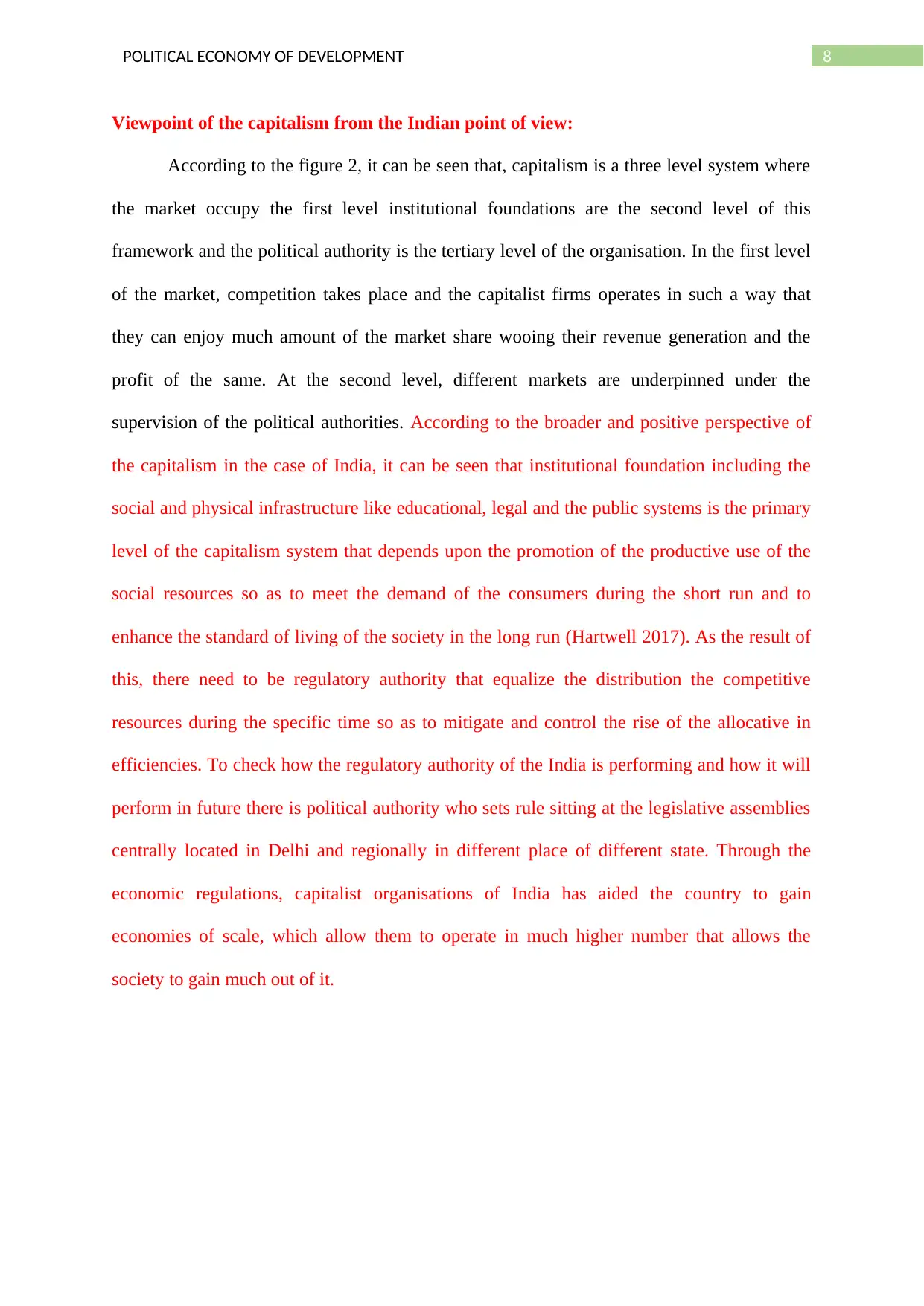
8POLITICAL ECONOMY OF DEVELOPMENT
Viewpoint of the capitalism from the Indian point of view:
According to the figure 2, it can be seen that, capitalism is a three level system where
the market occupy the first level institutional foundations are the second level of this
framework and the political authority is the tertiary level of the organisation. In the first level
of the market, competition takes place and the capitalist firms operates in such a way that
they can enjoy much amount of the market share wooing their revenue generation and the
profit of the same. At the second level, different markets are underpinned under the
supervision of the political authorities. According to the broader and positive perspective of
the capitalism in the case of India, it can be seen that institutional foundation including the
social and physical infrastructure like educational, legal and the public systems is the primary
level of the capitalism system that depends upon the promotion of the productive use of the
social resources so as to meet the demand of the consumers during the short run and to
enhance the standard of living of the society in the long run (Hartwell 2017). As the result of
this, there need to be regulatory authority that equalize the distribution the competitive
resources during the specific time so as to mitigate and control the rise of the allocative in
efficiencies. To check how the regulatory authority of the India is performing and how it will
perform in future there is political authority who sets rule sitting at the legislative assemblies
centrally located in Delhi and regionally in different place of different state. Through the
economic regulations, capitalist organisations of India has aided the country to gain
economies of scale, which allow them to operate in much higher number that allows the
society to gain much out of it.
Viewpoint of the capitalism from the Indian point of view:
According to the figure 2, it can be seen that, capitalism is a three level system where
the market occupy the first level institutional foundations are the second level of this
framework and the political authority is the tertiary level of the organisation. In the first level
of the market, competition takes place and the capitalist firms operates in such a way that
they can enjoy much amount of the market share wooing their revenue generation and the
profit of the same. At the second level, different markets are underpinned under the
supervision of the political authorities. According to the broader and positive perspective of
the capitalism in the case of India, it can be seen that institutional foundation including the
social and physical infrastructure like educational, legal and the public systems is the primary
level of the capitalism system that depends upon the promotion of the productive use of the
social resources so as to meet the demand of the consumers during the short run and to
enhance the standard of living of the society in the long run (Hartwell 2017). As the result of
this, there need to be regulatory authority that equalize the distribution the competitive
resources during the specific time so as to mitigate and control the rise of the allocative in
efficiencies. To check how the regulatory authority of the India is performing and how it will
perform in future there is political authority who sets rule sitting at the legislative assemblies
centrally located in Delhi and regionally in different place of different state. Through the
economic regulations, capitalist organisations of India has aided the country to gain
economies of scale, which allow them to operate in much higher number that allows the
society to gain much out of it.
⊘ This is a preview!⊘
Do you want full access?
Subscribe today to unlock all pages.

Trusted by 1+ million students worldwide
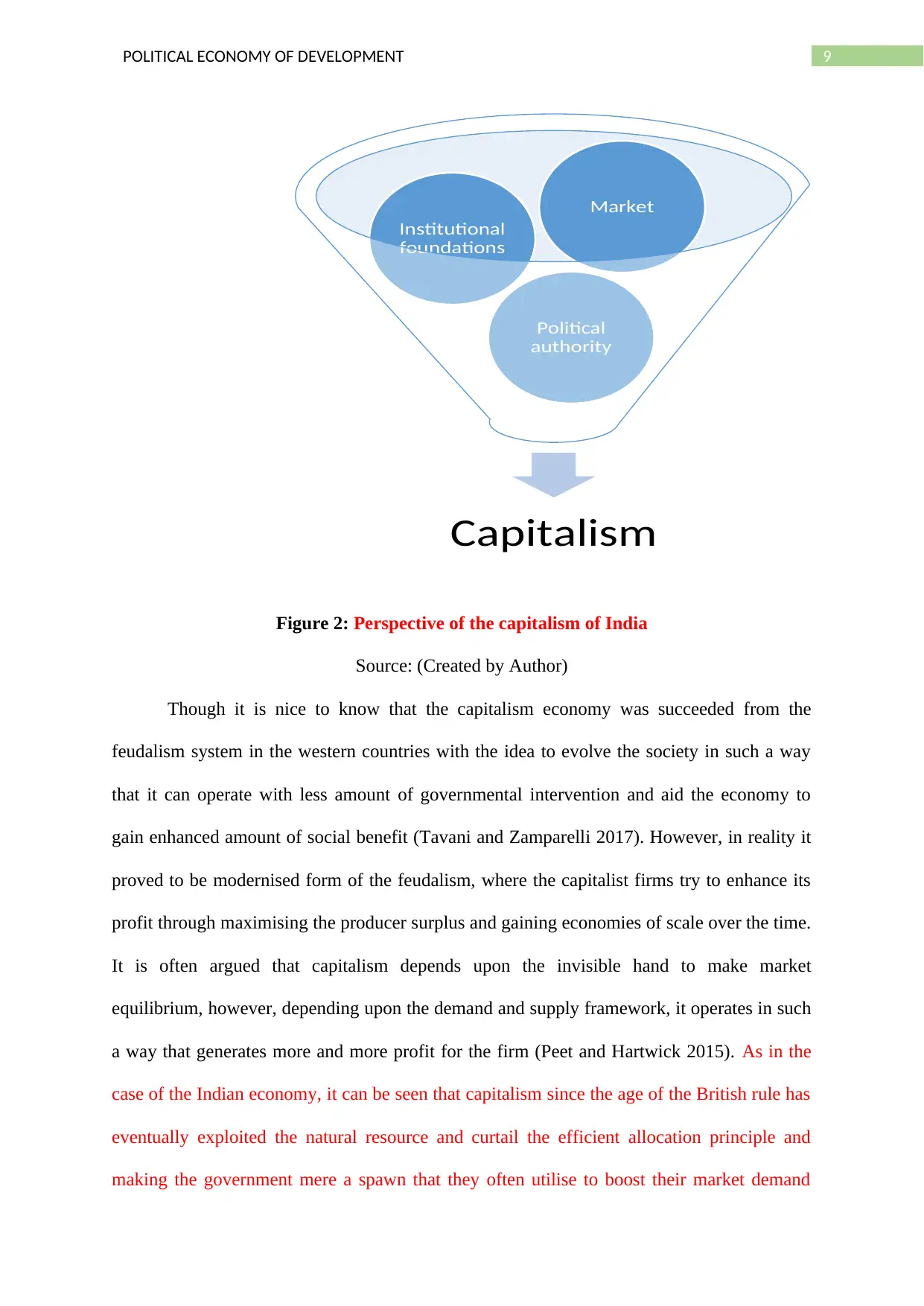
9POLITICAL ECONOMY OF DEVELOPMENT
Figure 2: Perspective of the capitalism of India
Source: (Created by Author)
Though it is nice to know that the capitalism economy was succeeded from the
feudalism system in the western countries with the idea to evolve the society in such a way
that it can operate with less amount of governmental intervention and aid the economy to
gain enhanced amount of social benefit (Tavani and Zamparelli 2017). However, in reality it
proved to be modernised form of the feudalism, where the capitalist firms try to enhance its
profit through maximising the producer surplus and gaining economies of scale over the time.
It is often argued that capitalism depends upon the invisible hand to make market
equilibrium, however, depending upon the demand and supply framework, it operates in such
a way that generates more and more profit for the firm (Peet and Hartwick 2015). As in the
case of the Indian economy, it can be seen that capitalism since the age of the British rule has
eventually exploited the natural resource and curtail the efficient allocation principle and
making the government mere a spawn that they often utilise to boost their market demand
Capitalism
Political
authority
Institutional
foundations
Market
Figure 2: Perspective of the capitalism of India
Source: (Created by Author)
Though it is nice to know that the capitalism economy was succeeded from the
feudalism system in the western countries with the idea to evolve the society in such a way
that it can operate with less amount of governmental intervention and aid the economy to
gain enhanced amount of social benefit (Tavani and Zamparelli 2017). However, in reality it
proved to be modernised form of the feudalism, where the capitalist firms try to enhance its
profit through maximising the producer surplus and gaining economies of scale over the time.
It is often argued that capitalism depends upon the invisible hand to make market
equilibrium, however, depending upon the demand and supply framework, it operates in such
a way that generates more and more profit for the firm (Peet and Hartwick 2015). As in the
case of the Indian economy, it can be seen that capitalism since the age of the British rule has
eventually exploited the natural resource and curtail the efficient allocation principle and
making the government mere a spawn that they often utilise to boost their market demand
Capitalism
Political
authority
Institutional
foundations
Market
Paraphrase This Document
Need a fresh take? Get an instant paraphrase of this document with our AI Paraphraser
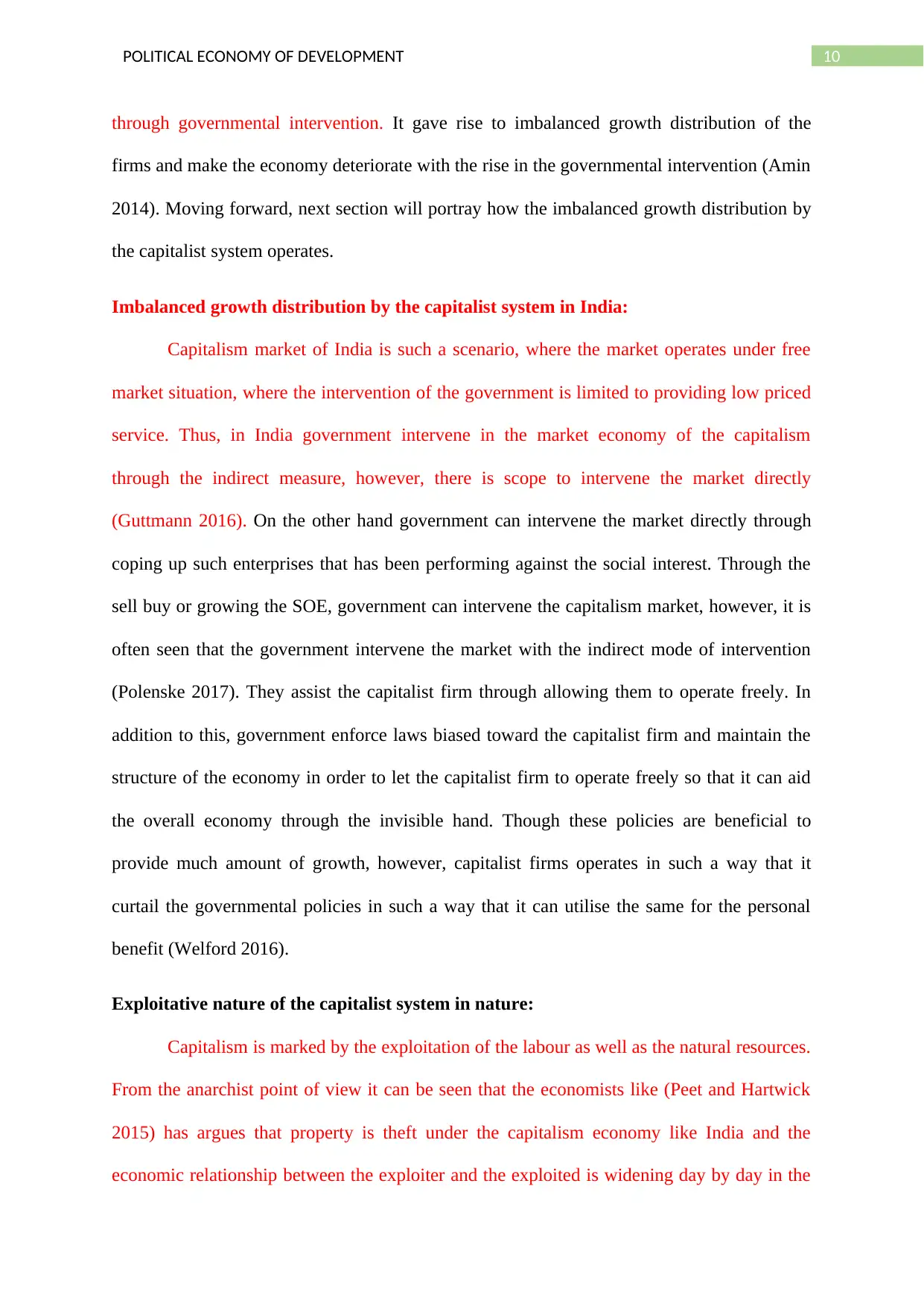
10POLITICAL ECONOMY OF DEVELOPMENT
through governmental intervention. It gave rise to imbalanced growth distribution of the
firms and make the economy deteriorate with the rise in the governmental intervention (Amin
2014). Moving forward, next section will portray how the imbalanced growth distribution by
the capitalist system operates.
Imbalanced growth distribution by the capitalist system in India:
Capitalism market of India is such a scenario, where the market operates under free
market situation, where the intervention of the government is limited to providing low priced
service. Thus, in India government intervene in the market economy of the capitalism
through the indirect measure, however, there is scope to intervene the market directly
(Guttmann 2016). On the other hand government can intervene the market directly through
coping up such enterprises that has been performing against the social interest. Through the
sell buy or growing the SOE, government can intervene the capitalism market, however, it is
often seen that the government intervene the market with the indirect mode of intervention
(Polenske 2017). They assist the capitalist firm through allowing them to operate freely. In
addition to this, government enforce laws biased toward the capitalist firm and maintain the
structure of the economy in order to let the capitalist firm to operate freely so that it can aid
the overall economy through the invisible hand. Though these policies are beneficial to
provide much amount of growth, however, capitalist firms operates in such a way that it
curtail the governmental policies in such a way that it can utilise the same for the personal
benefit (Welford 2016).
Exploitative nature of the capitalist system in nature:
Capitalism is marked by the exploitation of the labour as well as the natural resources.
From the anarchist point of view it can be seen that the economists like (Peet and Hartwick
2015) has argues that property is theft under the capitalism economy like India and the
economic relationship between the exploiter and the exploited is widening day by day in the
through governmental intervention. It gave rise to imbalanced growth distribution of the
firms and make the economy deteriorate with the rise in the governmental intervention (Amin
2014). Moving forward, next section will portray how the imbalanced growth distribution by
the capitalist system operates.
Imbalanced growth distribution by the capitalist system in India:
Capitalism market of India is such a scenario, where the market operates under free
market situation, where the intervention of the government is limited to providing low priced
service. Thus, in India government intervene in the market economy of the capitalism
through the indirect measure, however, there is scope to intervene the market directly
(Guttmann 2016). On the other hand government can intervene the market directly through
coping up such enterprises that has been performing against the social interest. Through the
sell buy or growing the SOE, government can intervene the capitalism market, however, it is
often seen that the government intervene the market with the indirect mode of intervention
(Polenske 2017). They assist the capitalist firm through allowing them to operate freely. In
addition to this, government enforce laws biased toward the capitalist firm and maintain the
structure of the economy in order to let the capitalist firm to operate freely so that it can aid
the overall economy through the invisible hand. Though these policies are beneficial to
provide much amount of growth, however, capitalist firms operates in such a way that it
curtail the governmental policies in such a way that it can utilise the same for the personal
benefit (Welford 2016).
Exploitative nature of the capitalist system in nature:
Capitalism is marked by the exploitation of the labour as well as the natural resources.
From the anarchist point of view it can be seen that the economists like (Peet and Hartwick
2015) has argues that property is theft under the capitalism economy like India and the
economic relationship between the exploiter and the exploited is widening day by day in the
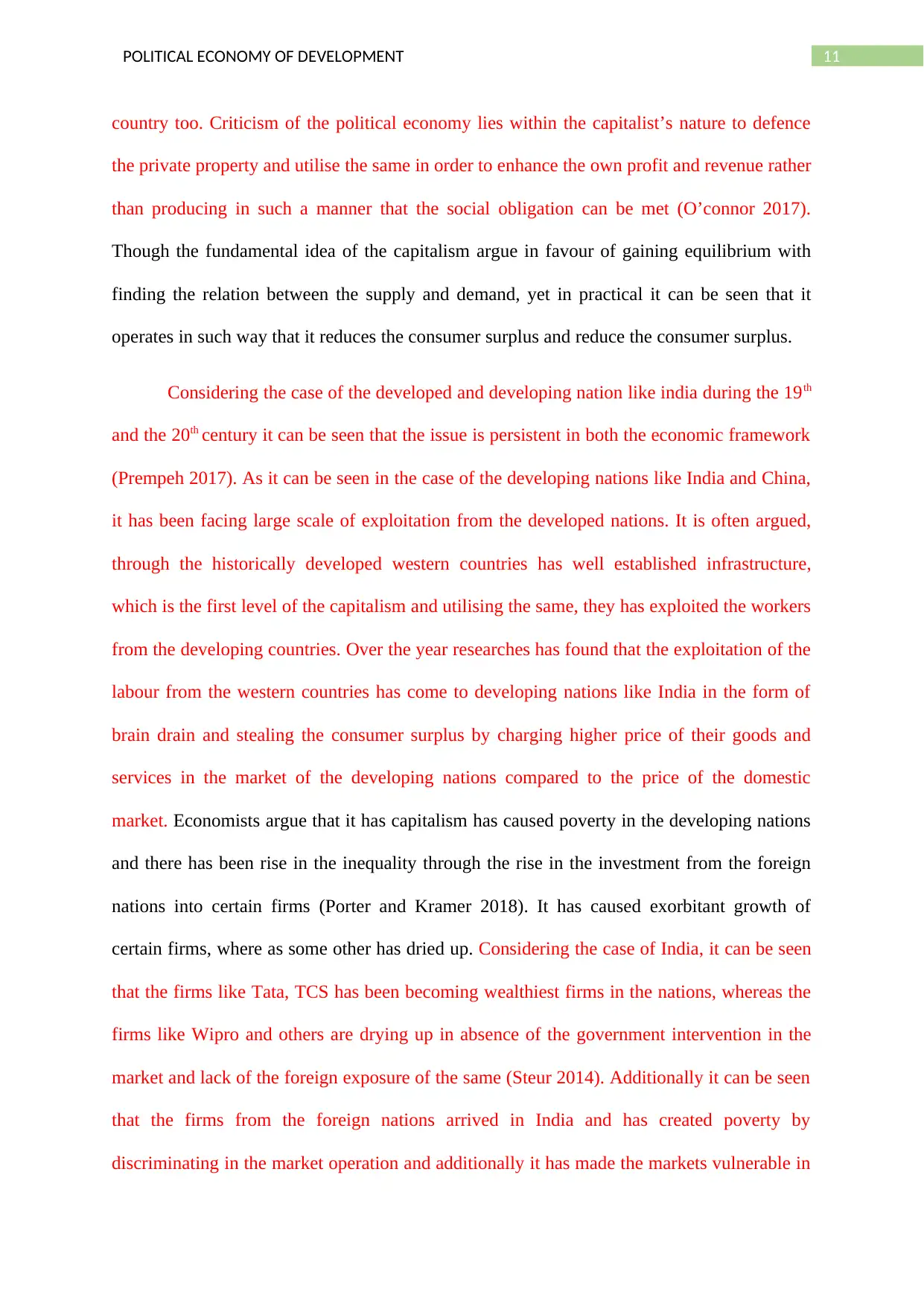
11POLITICAL ECONOMY OF DEVELOPMENT
country too. Criticism of the political economy lies within the capitalist’s nature to defence
the private property and utilise the same in order to enhance the own profit and revenue rather
than producing in such a manner that the social obligation can be met (O’connor 2017).
Though the fundamental idea of the capitalism argue in favour of gaining equilibrium with
finding the relation between the supply and demand, yet in practical it can be seen that it
operates in such way that it reduces the consumer surplus and reduce the consumer surplus.
Considering the case of the developed and developing nation like india during the 19th
and the 20th century it can be seen that the issue is persistent in both the economic framework
(Prempeh 2017). As it can be seen in the case of the developing nations like India and China,
it has been facing large scale of exploitation from the developed nations. It is often argued,
through the historically developed western countries has well established infrastructure,
which is the first level of the capitalism and utilising the same, they has exploited the workers
from the developing countries. Over the year researches has found that the exploitation of the
labour from the western countries has come to developing nations like India in the form of
brain drain and stealing the consumer surplus by charging higher price of their goods and
services in the market of the developing nations compared to the price of the domestic
market. Economists argue that it has capitalism has caused poverty in the developing nations
and there has been rise in the inequality through the rise in the investment from the foreign
nations into certain firms (Porter and Kramer 2018). It has caused exorbitant growth of
certain firms, where as some other has dried up. Considering the case of India, it can be seen
that the firms like Tata, TCS has been becoming wealthiest firms in the nations, whereas the
firms like Wipro and others are drying up in absence of the government intervention in the
market and lack of the foreign exposure of the same (Steur 2014). Additionally it can be seen
that the firms from the foreign nations arrived in India and has created poverty by
discriminating in the market operation and additionally it has made the markets vulnerable in
country too. Criticism of the political economy lies within the capitalist’s nature to defence
the private property and utilise the same in order to enhance the own profit and revenue rather
than producing in such a manner that the social obligation can be met (O’connor 2017).
Though the fundamental idea of the capitalism argue in favour of gaining equilibrium with
finding the relation between the supply and demand, yet in practical it can be seen that it
operates in such way that it reduces the consumer surplus and reduce the consumer surplus.
Considering the case of the developed and developing nation like india during the 19th
and the 20th century it can be seen that the issue is persistent in both the economic framework
(Prempeh 2017). As it can be seen in the case of the developing nations like India and China,
it has been facing large scale of exploitation from the developed nations. It is often argued,
through the historically developed western countries has well established infrastructure,
which is the first level of the capitalism and utilising the same, they has exploited the workers
from the developing countries. Over the year researches has found that the exploitation of the
labour from the western countries has come to developing nations like India in the form of
brain drain and stealing the consumer surplus by charging higher price of their goods and
services in the market of the developing nations compared to the price of the domestic
market. Economists argue that it has capitalism has caused poverty in the developing nations
and there has been rise in the inequality through the rise in the investment from the foreign
nations into certain firms (Porter and Kramer 2018). It has caused exorbitant growth of
certain firms, where as some other has dried up. Considering the case of India, it can be seen
that the firms like Tata, TCS has been becoming wealthiest firms in the nations, whereas the
firms like Wipro and others are drying up in absence of the government intervention in the
market and lack of the foreign exposure of the same (Steur 2014). Additionally it can be seen
that the firms from the foreign nations arrived in India and has created poverty by
discriminating in the market operation and additionally it has made the markets vulnerable in
⊘ This is a preview!⊘
Do you want full access?
Subscribe today to unlock all pages.

Trusted by 1+ million students worldwide
1 out of 17
Related Documents
Your All-in-One AI-Powered Toolkit for Academic Success.
+13062052269
info@desklib.com
Available 24*7 on WhatsApp / Email
![[object Object]](/_next/static/media/star-bottom.7253800d.svg)
Unlock your academic potential
Copyright © 2020–2026 A2Z Services. All Rights Reserved. Developed and managed by ZUCOL.





